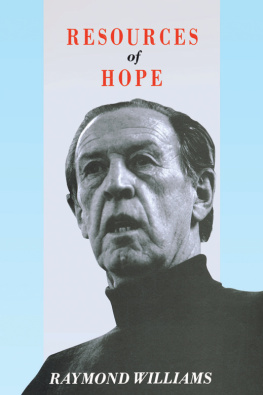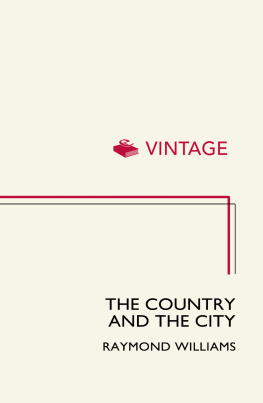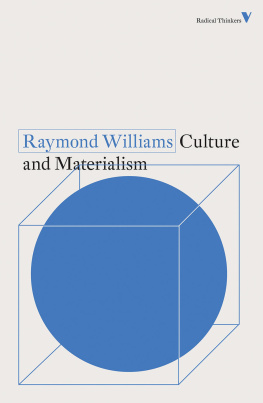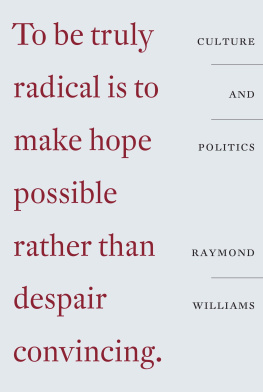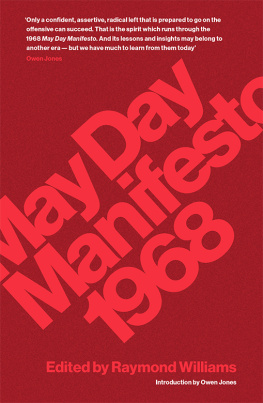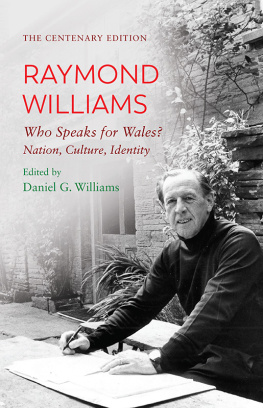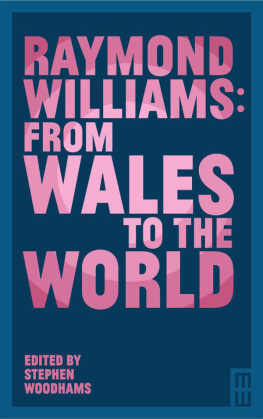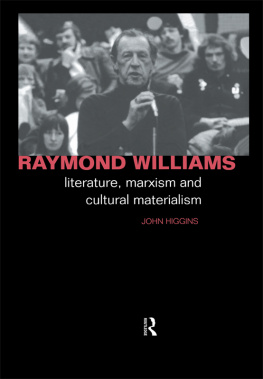Raymond Williams - Culture and Society: Coleridge to Orwell
Here you can read online Raymond Williams - Culture and Society: Coleridge to Orwell full text of the book (entire story) in english for free. Download pdf and epub, get meaning, cover and reviews about this ebook. year: 2015, publisher: Random House, genre: Politics. Description of the work, (preface) as well as reviews are available. Best literature library LitArk.com created for fans of good reading and offers a wide selection of genres:
Romance novel
Science fiction
Adventure
Detective
Science
History
Home and family
Prose
Art
Politics
Computer
Non-fiction
Religion
Business
Children
Humor
Choose a favorite category and find really read worthwhile books. Enjoy immersion in the world of imagination, feel the emotions of the characters or learn something new for yourself, make an fascinating discovery.

- Book:Culture and Society: Coleridge to Orwell
- Author:
- Publisher:Random House
- Genre:
- Year:2015
- Rating:3 / 5
- Favourites:Add to favourites
- Your mark:
- 60
- 1
- 2
- 3
- 4
- 5
Culture and Society: Coleridge to Orwell: summary, description and annotation
We offer to read an annotation, description, summary or preface (depends on what the author of the book "Culture and Society: Coleridge to Orwell" wrote himself). If you haven't found the necessary information about the book — write in the comments, we will try to find it.
Culture and Society: Coleridge to Orwell — read online for free the complete book (whole text) full work
Below is the text of the book, divided by pages. System saving the place of the last page read, allows you to conveniently read the book "Culture and Society: Coleridge to Orwell" online for free, without having to search again every time where you left off. Put a bookmark, and you can go to the page where you finished reading at any time.
Font size:
Interval:
Bookmark:
CONTENTS
, George Eliot
Vivid, lucid and exhilarating, Culture and Society overturns conventional social and historical thinking: its analysis of nineteenth and early twentieth-century writing reveals how the very notion of culture was developed as a response to the industrial revolution and the social and political changes it brought in its wake. Among the writers seen as contributing to this important tradition of cultural thinking are Edmund Burke, John Ruskin, Matthew Arnold, William Morris, George Gissing, Bernard Shaw, D. H. Lawrence, T. S. Eliot and George Orwell.
A recognised classic, Culture and Society is as thought-provoking and revolutionary today as it ever was.
Raymond Williams is a Fellow of Jesus College, Cambridge. The author of The Country and the City, The English Novel from Dickens to Lawrence and Drama from Ibsen to Brecht, he has also written several novels.
Raymond Williams was born in 1921 in the Welsh border village of Pandy, and was educated at the village school, at Abergavenny Grammar School, and at Trinity College, Cambridge. After serving in the war as an anti-tank captain, he became an adult education tutor in the Oxford University Delegacy for Extra-Mural Studies. In 1947 he was an editor of Politics and Letters, and in the 1960s was general editor of the New Thinkers Library. He was elected Fellow of Jesus College, Cambridge, in 1961 and was later appointed University Professor of drama.
His books several of which are being published by The Hogarth Press include Culture and Society (1958), The Long Revolution (1961) and its sequel Towards 2000 (1983); Communications (1962) and Television: Technology and Cultural Form (1974); Drama in Performance (1954), Modern Tragedy (1966) and Drama from Ibsen to Brecht (1968); The English Novel from Dickens to Lawrence (1970), Orwell (1971) and The Country and the City (1973); Politics and Letters (interviews) (1979) and Problems in Materialism and Culture (selected essays) (1980); and four novels the Welsh trilogy of Border Country (1960), Second Generation (1964) and The Fight for Manod (1979), and The Volunteers (1978). His latest novel is Loyalties and he is currently working on another, People of the Black Mountains.
Raymond Williams was married in 1942, has three children, and divides his time between Saffron Walden, near Cambridge, and Wales.
For Merryn, Ederyn and Gwydion Madawc

The organising principle of this book is the discovery that the idea of culture, and the word itself in its general modern uses, came into English thinking in the period which we commonly describe as that of the Industrial Revolution. The book is an attempt to show how and why this happened, and to follow the idea through to our own day. It thus becomes an account and an interpretation of our responses in thought and feeling to the changes in English society since the late eighteenth century. Only in such a context can our use of the word culture, and the issues to which the word refers, be adequately understood.
The book continues the enquiry which began with the founding of the review Politics and Letters, which I edited, with Mr Clifford Collins and Mr Wolf Mankowitz, between 1946 and 1948. Our object then was to enquire into and where possible reinterpret this tradition which the word culture describes in terms of the experience of our own generation. I am permanently indebted to my former co-editors for what I learned with them in that first attempt. During the actual writing of the book, since 1950, I have again been particularly indebted to Mr Collins, and also to my colleague Mr Anthony McLean. I gained much benefit from discussing the work in progress with Humphry House and Frances Klingender, whose valuable work survives their early deaths. Others, among many who have helped me, whom I ought particularly to mention are Mr F. W. Bateson, Mr E. F. Bellchambers, Mr Henry Collins, Mr S. J. Colman and Mr H. P. Smith. My wife has argued the manuscript with me, line by line, to an extent which, in certain chapters, makes her virtually the joint author. But I cannot finally involve anyone but myself, either in my judgements or in my errors.
Because of the form of the book, I have not been able to include any detailed accounts of the changes in words and meanings to which I refer. I shall publish this supporting evidence, later, in a specialist paper on Changes in English during the Industrial Revolution. The brief accounts given in my text are subject to the usual dangers of summary, and the reader primarily interested in the words themselves must be referred to the paper mentioned, which adds some new evidence to the existing authorities.
While this book has been in the press I have been considering the directions in which further work in its field might profitably move, and it may be useful to note these. It seems to me, first, that we are arriving, from various directions, at a point where a new general theory of culture might in fact be achieved. In this book I have sought to clarify the tradition, but it may be possible to go on from this to a full restatement of principles, taking the theory of culture as a theory of relations between elements in a whole way of life. We need also, in these terms, to examine the idea of an expanding culture, and its detailed processes. For we live in an expanding culture, yet we spend much of our energy regretting the fact, rather than seeking to understand its nature and conditions. I think a good deal of factual revision of our received cultural history is necessary and urgent, in such matters as literacy, educational levels, and the press. We also need detailed studies of the social and economic problems of current cultural expansion, as means towards an adequate common policy. Finally, in the special field of criticism, we may be able to extend our methods of analysis, in relation to the re-definitions of creative activity and communication which various kinds of investigation are making possible. All this work will be difficult, but it may be helped by an understanding of the context of our present vocabulary in these matters, to which this book is offered as a contribution.
Parts of the book have previously appeared, in other forms, in Essays in Criticism and Universities and Left Review.
R.W.
It is now more than a quarter of a century since I wrote Culture and Society. I sometimes find, when I re-read it or parts of it, that it is like reading a book written by someone else. Yet it was in this book that I first found a position which expressed my sense of what had happened and was still happening in industrial civilisation, and in its art and thought. I have since developed and sometimes changed particular points and judgements, but I have not changed my view that one of the central ways of understanding the two extraordinary centuries which have so greatly changed the world and which underlie its now major crisis is through the detailed and complex thinking about culture which has been active and vibrant at every stage.
As the original Introduction explains, the book was formed around my discovery that the concept of culture, in its modern senses, came through at the time of the Industrial Revolution. The book was organised around the new kinds of problem and question which were articulated not only in the new sense of
Next pageFont size:
Interval:
Bookmark:
Similar books «Culture and Society: Coleridge to Orwell»
Look at similar books to Culture and Society: Coleridge to Orwell. We have selected literature similar in name and meaning in the hope of providing readers with more options to find new, interesting, not yet read works.
Discussion, reviews of the book Culture and Society: Coleridge to Orwell and just readers' own opinions. Leave your comments, write what you think about the work, its meaning or the main characters. Specify what exactly you liked and what you didn't like, and why you think so.

